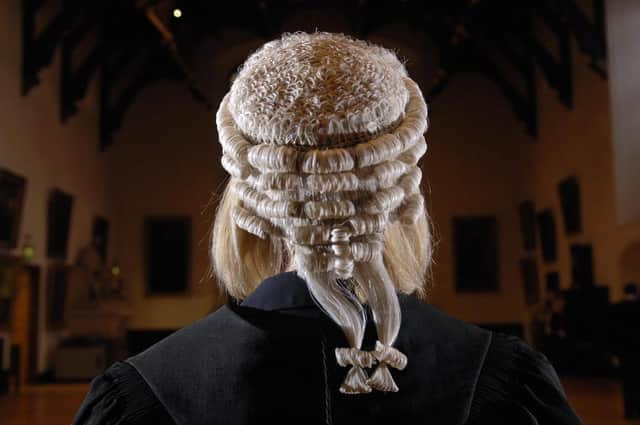Police warning for a man attacking a woman? Sometimes the law really is an ass - Susan Dalgety


Our latest gripe? The way the law treats us. Several Sundays ago, Julie Marshall, 54, a women’s rights activist, was assaulted by a twenty something man at a rally in Aberdeen’s Duthie Park. Julie ended up with a black eye and badly bruised arm. The man? He got a ticking off from the police – a recorded police warning to give it its official title – and that was that.
Contrast this with a more recent event where a government minister, Patrick Harvie, was heckled during a TV interview. “Deviant”, shouted a bloke. Harvie, who is bisexual, responded by calling the man a “bigot” and the Scottish Greens reported the incident to police. A PoliceScotland spokesperson later said: "Following a report of homophobic comments, a 59-year-old man has been arrested and charged. A report will be sent to the procurator fiscal."
Advertisement
Hide AdAdvertisement
Hide AdThis apparently contradictory response to actual bodily harm and verbal abuse is somewhat at odds with the Scottish Government’s high-minded ambition to end violence against women.
“Our vision is of a strong and flourishing Scotland where all individuals are equally safe and respected, and where women and girls live free from all forms of violence and abuse, as well as the attitudes that perpetuate it,” reads the introduction to its strategy to end violence against women and girls.
Roddy Dunlop, Dean of the Faculty of Advocates, and therefore one of Scotland’s finest legal minds, took to social media to explain the disparity between shouting hateful abuse at someone and giving a woman a black eye.
He explained that an assault on a woman for being a woman, or for being a gender critical woman, is not an aggravated crime. “A report of such could be dealt with by police warning, or not prosecuted by the PF (Procurator Fiscal).
“On the other hand, a s38 (breach of the peace) which involves no assault, but which does involved alleged hate crime (i.e. race, religion, sexual orientation etc – but not misogyny) is aggravated and in general must be prosecuted and is not subject to those discretions.”
He concluded: “What this means is a breach of the peace involving verbal abuse of certain minorities must be prosecuted; but the assault of a woman does not have to be. Whether this is desirable or advisable, I leave to others. But it’s where the law stands right now.”
So that’s clear then. Insulting someone for their sexuality is a crime – as it should be – but assaulting a woman isn’t necessarily worthy of proper investigation. Sometimes it seems the law truly is an ass.
And consider this. According to Dr Kath Murray, senior criminologist and member of the feminist think tank MBM Policy, Police Scotland told a meeting of the Scottish Police Authority last week that the force wants to increase the use and range of recorded police warnings, yet guidelines on their use are kept private.
Advertisement
Hide AdAdvertisement
Hide Ad“As far as I know there’s not been any formal evaluation since their introduction,” Dr Murray said in response. “If Police Scotland are looking to expand this scheme, they also need to think about legitimacy and transparency,” she added. Indeed. A hulking husband who has just given his wife a black eye while screaming abuse at her may be happy to get off with a police warning. But is it justice?
But perhaps the biggest headache facing Humza Yousaf as he starts on his first full parliamentary year as Scotland’s First Minister is a court case that begins in three weeks’ time. And yes, it involves those troublesome women again. While Yousaf will be keen to keep the nation’s eye on his ambitions for Scotland – which seem to mainly focus on trying to leave the UK – the media’s attention will be drawn to the Court of Session.
Over three days, from 19 September, Lady Haldane will hear the UK Government argue why it blocked Scotland’s Gender Recognition Reform Bill – which allows anyone over the age of 16 to change their sex by filling in a form (self-ID) – from becoming law; while the Scottish Government will argue – as Yousaf has already – that the decision was a “signal that the UK government can veto any legislation they disagree with at a whim”.
It has all the ingredients of a political pot boiler, namely sex and conflict , and has the potential to run on for months. This month’s court battle is simply a scene-setter. The battle will likely end up in the Supreme Court with no final decision reached until possibly after the next general election.
But, after a lengthy campaign by women from across all parties and none to expose the dangers of self-ID, particularly its effect on the provisions of the 2010 Equality Act, any sensible politician would now admit, as Scottish Labour’s Anas Sarwar was forced to recently, that the SNP and Scottish Greens’ gender policy is “deeply flawed”.
If Humza Yousaf really does want to “uphold women’s rights,” as he promised only a few months ago when he held up a pretty pink heart and fluttered his eyelashes at us, he should admit defeat, rip up the Gender Reform Bill and meet grassroots women’s groups to find out what they really want . And here’s a suggestion for the First Minister and his advisers. The first thing on the agenda should be a review of the use of recorded police warnings in cases where men assault women.
Comments
Want to join the conversation? Please or to comment on this article.